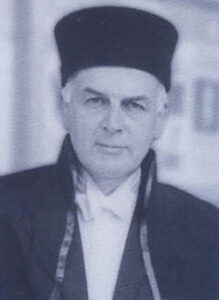Martin Wight (26 Nov 1913 – 15 Jul 1972): Analyst of International Relations Traditions
BIOGRAPHIES, 23 Nov 2020
René Wadlow – TRANSCEND Media Service
Martin Wight was an analyst of approaches to the study and practice of international relations. He taught at the London School of Economics and later at the then newly created University of Sussex. He was a conscientious objector to military service during the Second World War, influenced by the Christian Pacifism of Rev. Dick Sheppard and his Peace Pledge Union. During part of the war years, he was at Chat am House working under the direction of Arnold Toynbee who instilled in Wight a “challenge and response” view of world history and an interest in classical Greek history.
When the United Nations was created, he spent most of the 1946-1947 year at Lake Success, just outside of New York City where the U.N. was then housed. He was interested in the ways that States interacted especially in the Security Council and the start of the USA-USSR tensions. His reporting led to his short 1947 book Power Politics.
In 1957, he was invited to teach international relations at the University of Chicago to replace Hans Morgenthau who had a year of absence. It was during this academic year that Wight first developed his views on the three approaches (or traditions) of international relations theory: what he termed the Realist, the Rationalist, and the Revolutionist schools. I was his graduate student that year and so benefited from his approach.
The published form of this approach was only made available after his early death at the age of 58. He was basically a teacher and encouraged discussion among his students. He published little, and his major writings were compiled after his death by former students with the help of his German-born wife.
The realist school was easy to define, especially that in 1957 he was replacing Hans Morgenthau who was the best known international relations writer who used the title for himself. Wight also knew H.H. Carr in England who could be connected to the realist tradition. Also in the 1950s the writings of George Kennan, both as a writer and a practitioner, were highly visible.
It was more difficult to set out the champions in the present of the “Rationalist school”. The Rationalists are those who stress international law, institution building, and cooperation among States. While there were a good number of writers in the international law tradition, there were none who stood out as the chief champion. Wight thus placed President Franklin Roosevelt as the most representative member of this tradition which recognized the central role of States in the international society but who also stressed the role of cooperation among States bounded by the rules of the international society.
The “Revolutionist tradition” is marked by those revolutions which stressed doctrines which cut across State lines and proclaimed the unity of humanity: the Protestant Revolution, the French Revolution, and the Russian Revolution with Lenin as the most articulate spokesperson for the Russian Revolution. Each of the revolutionary ideologies created a “counter revolution.” In 1957 the Russian and the NATO counter-revolution were the everyday life of international relations.
Wight’s emphasis on schools of international relations approaches helps to remind us that we do not start with a blank page but rather we are part of a long line of thinkers who have tried to deal with the issues of people, doctrines and States within the international society.
______________________________________
 René Wadlow is a member of the TRANSCEND Network for Peace Development Environment. He is President of the Association of World Citizens, an international peace organization with consultative status with ECOSOC, the United Nations organ facilitating international cooperation and problem-solving in economic and social issues, and editor of Transnational Perspectives.
René Wadlow is a member of the TRANSCEND Network for Peace Development Environment. He is President of the Association of World Citizens, an international peace organization with consultative status with ECOSOC, the United Nations organ facilitating international cooperation and problem-solving in economic and social issues, and editor of Transnational Perspectives.
Tags: Biography
This article originally appeared on Transcend Media Service (TMS) on 23 Nov 2020.
Anticopyright: Editorials and articles originated on TMS may be freely reprinted, disseminated, translated and used as background material, provided an acknowledgement and link to the source, TMS: Martin Wight (26 Nov 1913 – 15 Jul 1972): Analyst of International Relations Traditions, is included. Thank you.
If you enjoyed this article, please donate to TMS to join the growing list of TMS Supporters.

This work is licensed under a CC BY-NC 4.0 License.
